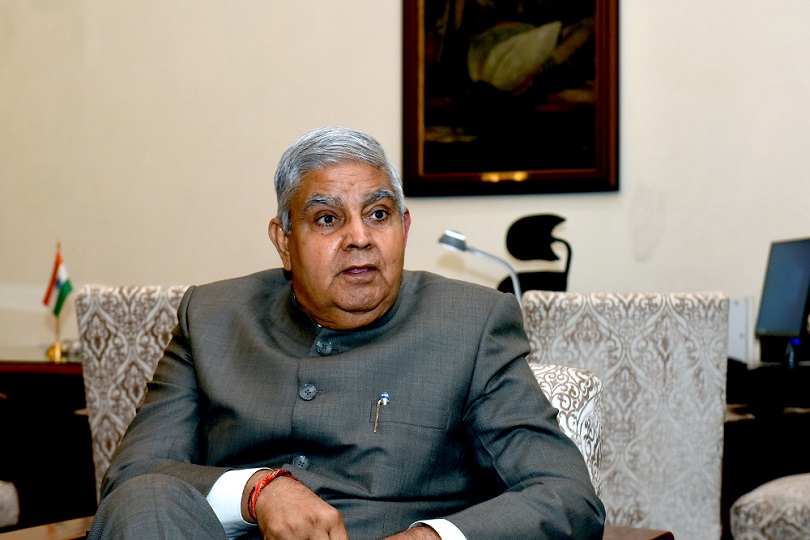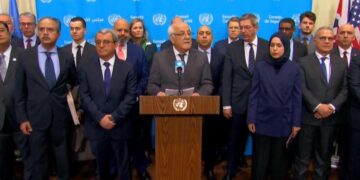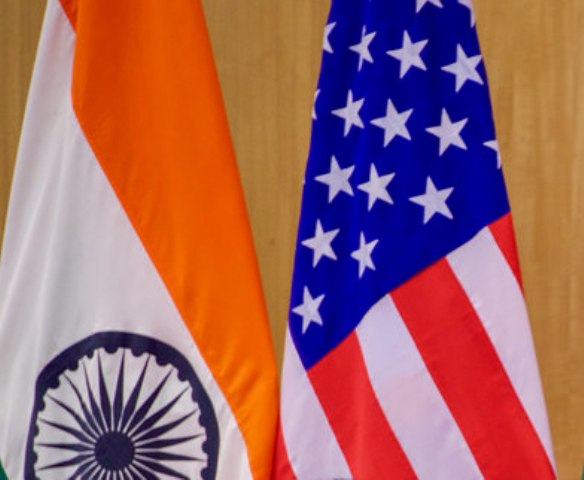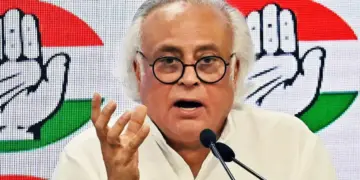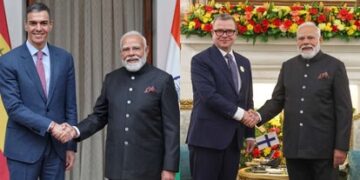New Delhi: Vice President Jagdeep Dhankhar on Thursday questioned the judiciary setting a timeline for the president to take decisions and act as a “super Parliament”, saying the Supreme Court cannot fire a “nuclear missile” at democratic forces.
Dhankhar’s strong words to the judiciary came during his speech to Rajya Sabha interns, days after the Supreme Court sought to fix a timeline for the president to grant assent to the bills reserved for her consideration by the governor.
“So, we have judges who will legislate, who will perform executive functions, who will act as super Parliament and absolutely have no accountability because the law of the land does not apply to them,” Dhankhar said.
The vice president also described Article 142, which grants plenary powers to the Supreme Court, as a “nuclear missile against democratic forces available to the judiciary 24×7”.
“Article 142 has become a nuclear missile against democratic forces (and) available to (the) judiciary 24×7,” he said.
Article 142 of the Constitution gives the Supreme Court the power to issue orders that ensure “complete justice” in any matter before it.
This power is also known as the Supreme Court’s “plenary power”.
“There is a directive to the president by a recent judgment. Where are we heading?
“What is happening in the country? We have to be extremely sensitive. It is not a question of someone filing a review or not. We never bargained for democracy for this day. President being called upon to decide in a time-bound manner, and if not, becomes law,” Dhankhar said.
The vice president said his worries were at a “very highest level” and he had never thought in “my life” that he would have the occasion to see it.
He reminded the audience that the president of India is in a very elevated position.
“(The) president takes an oath to preserve, protect and defend the Constitution. Others, including ministers, the vice president, parliamentarians and judges take an oath to abide by the Constitution,” Dhankhar said.
“We cannot have a situation where you direct the president of India and on what basis? The only right you have under the Constitution is to interpret the Constitution under Article 145(3). There it has to be five judges or more…,” he said.
Stressing the principle of separation of powers, he underlined that when the government is elected by the people, the government is accountable to Parliament and to the people in the elections.
“There is a principle of accountability in operation. In Parliament, you can ask questions… But if this executive governance is by the judiciary, how do you ask questions? Whom do you hold accountable in elections?
“Time has come when our three institutions — legislature, judiciary and executive — must blossom… Any incursion by one in the domain of the other poses a challenge, which is not good….” Dhankhar said.
Why no FIR in burnt cash discovery at judge’s house case, asks Dhankhar
Vice President Jagdeep Dhankhar on Thursday questioned the lack of an FIR in the discovery of wads of burnt cash case from the residence of a high court judge, wondering whether a “category beyond law” has secured immunity from prosecution.
“If the event had taken place at his (common man’s) house, the speed would have been an electronic rocket. Now it is not even a cattle cart,” Dhankhar said.
He also said the independence of the judiciary is not some kind of “impregnable cover” against inquiry, investigation and probe, and asserted that the surest way to degenerate an institution or an individual is to give a total guarantee against probes.
The Supreme Court ordered an in-house probe into the alleged discovery of half-burnt wads of cash from Justice Yashwant Varma’s residence after a fire on the night of Holi on March 14. Justice Varma has now been repatriated from the Delhi High Court to his parent high court of Allahabad.
Dhankhar also questioned the legal standing of the three-judge panel carrying out an in-house probe into the matter.
Referring to the case, he said every Indian is deeply concerned.
Dhankhar said while a committee of three judges is probing the matter, an investigation is the domain of the executive and not the judiciary.
He said the committee has not been set up under any provision of the Constitution or law.
“And what can the committee do? The committee can at the most make a recommendation. Recommendation to whom? And for what?
“The kind of mechanism we have for judges, the only action finally that can be taken is by Parliament (by way of removal of the judge),” he said.
The committee report, Dhankhar said, “inherently lacks legal standing”.
“It is now over a month. Even if it is a can of worms, even if there are skeletons in the cupboard, (it’s) time to blow up the can, (it’s) time for its lid to go out, and (it’s) time for the cupboard to collapse. Let the worms and skeletons be in the public domain so that cleansing takes place,” Dhankhar said here addressing a group of Rajya Sabha interns.
He said for seven days no one knew about the incident.
“We have to ask questions to ourselves. Is the delay explainable? Condonable?
“Does it not raise certain fundamental questions? In any ordinary situation, things would have been different,” he said.
After the incident was confirmed by the top court, it became clear that something required to be investigated, he said.
“Now the nation waits with bated breath. The nation is restive because one of our institutions, to which people have looked up always with the highest respect and deference, was put in the dock,” he said.
Emphasising the significance of the rule of law, he said in a democracy purity of its criminal justice system defines its direction.
He said no investigation under the law is in progress at the moment due to the lack of an FIR.
“It is law of the land that every cognisable offence is required to be reported to the police and failure to do so, and failure to report a cognisable offence is a crime. Therefore, you all will be wondering why there has been no FIR,” he said.
An FIR, Dhankhar pointed out, can be registered against anyone and any constitutional functionary, including the vice president.
“One has only to activate the rule of law. No permission is required. But if it is judges, their category, FIR cannot be straightaway registered. It has to be approved by the concerned in the judiciary,” he said.
He underlined that the Constitution has accorded immunity from prosecution only to the president and the governors.
“So how come a category beyond law has secured this immunity?” he wondered.
Underscoring the importance of transparency, the vice president referred to a decision of a Lokpal bench that it possessed the jurisdiction to investigate corruption complaints against high court judges.
He said taking a suo motu cognisance, the apex court stayed the order on the grounds of independence of the judiciary.
“This independence is not a protection. This independence is not some kind of impregnable cover against inquiry, investigation or probe.
“Institutions thrive with transparency, with there being probe. The surest way to degenerate an institution or an individual is to give total guarantee there will be no inquiry, no scrutiny, no probe,” Dhankhar said.

